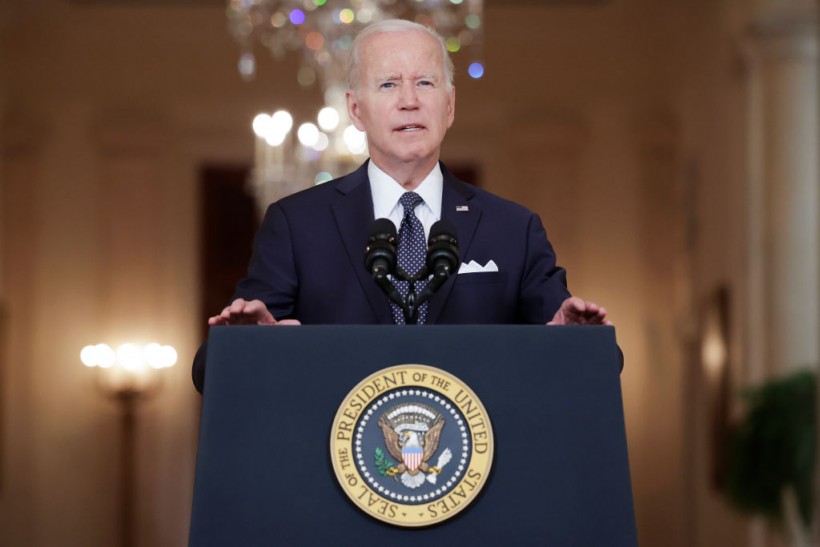
(Photo : Photo by Kevin Dietsch/Getty Images)
United States President Joe Biden will conduct a three-day visit to the Middle East region next month, according to a White House announcement on Tuesday.
United States President Joe Biden will conduct a three-day visit to the Middle East region next month, according to a White House announcement on Tuesday.
President Biden will make stops in Israel, the West Bank, and Saudi Arabia during his trip from July 13 to July 16 to meet several leaders in the Middle East.
Finding Solutions to Various Issues of Israel, Palestine
Pres. Biden will begin his Middle East trip in Israel, where he will visit a site where US-funded defense systems like the Iron Dome are in operation, according to a senior administration official who briefed reporters Monday.
The official said the visit would focus on Israel's "increasing integration into the region" as a result of the Abraham Accords, which were negotiated under Trump's administration, as well as relations with Jordan and Egypt. The president will hold a virtual summit of the so-called I2-U2 (India, Israel, the United Arab Emirates, and the US) on the first leg of his Middle East trip to tackle food security and other issues, per CBS News report.
Per The Jerusalem Post, Biden's trip will also overlap with the Maccabiah Games, which gather Jewish athletes from all over the world to Israel for an Olympics-style competition, and Pres. Biden "may have the opportunity to meet some of the athletes."
At his second stop in the West Bank, Biden is expected to meet with President Mahmoud Abbas of the Palestinian Authority and other Palestinian leaders. According to the official, the president "looks forward to reaffirming his lifelong commitment to a two-state solution" and establishing means to "rekindle a new political horizon that can ensure equal measures of freedom, security, prosperity, and dignity to Israelis and Palestinians alike."
Read Also: UN Rights Chief Michelle Bachelet Declines Second Term Amid Criticism Over Stance on China
Will Pres. Biden Seek Saudi Arabia's Help To Lower US Oil Prices?
The president's tour will conclude in the Kingdom of Saudi Arabia, where he will convene with Gulf Cooperation Council, which includes leaders from Bahrain, Kuwait, Oman, Qatar, Saudi Arabia, and the United Arab Emirates, as well as Iraq, Jordan, and Egypt. The leaders will discuss climate change, infrastructure, human rights, and food security at the summit.
Biden will also travel to Jeddah "at the invitation" of Saudi King Salman bin Abdulaziz Al Saud, according to White House press secretary Karine Jean-Pierre.
In a statement, Jean-Pierre said, "The president appreciates King Salman's leadership and his invitation." He looks forward to this important visit to Saudi Arabia, which has been a strategic partner of the United States for nearly eight-decade."
The Saudi embassy in Washington said in a statement that Mr. Biden and the Crown Prince Mohammed bin Salman will "hold official talks that will focus on various areas of bilateral cooperation."
According to a Politico report, John Kirby, the National Security Council's coordinator for strategic communications, told MSNBC on Tuesday that oil production will be included in Biden's meetings with Saudi authorities. The war in Yemen and Iran's "destabilizing behavior" will also be covered.
Kirby also expects that Biden would meet with Saudi Crown Prince Mohammed bin Salman and King Salman in bilateral discussions.
"Of course, the crown prince is on that team, so I suspect he will certainly see the crown prince in the context of these meetings," he noted.
Pres. Biden could use his visit to persuade Saudi Arabia, the world's top oil exporter, to help stabilize oil markets, cutting prices in the United States. However, Jean-Pierre told the media on Monday that perceiving dialogue with Saudi officials as "asking for oil" is "simply wrong" and a misconception of both the complexity of the situation and the US' "multifaceted discussions with the Saudis."
Related Article: US Power Grid Could Go Offline If Russia Stops Uranium Supply








